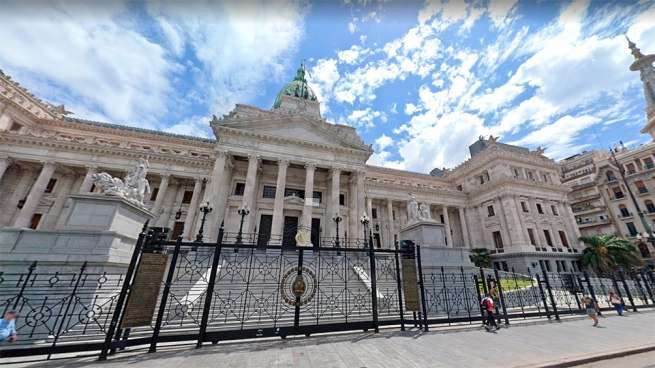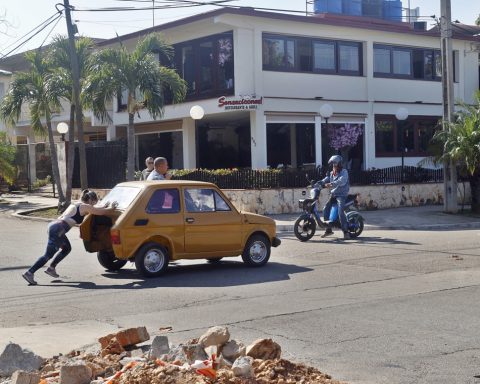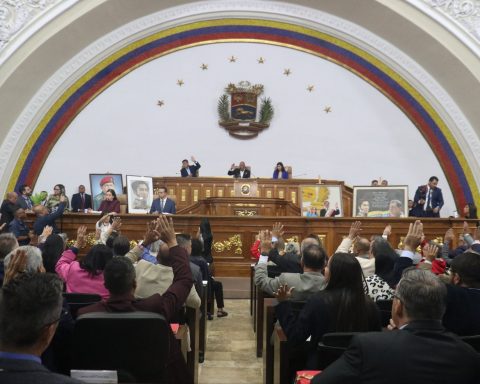The agreement between Argentina and the International Monetary Fund (IMF) will begin to be debated next Monday in a plenary session of commissions of the Chamber of Deputies that will count with the presence of the Minister of Economy, Martin Guzman; and whose treatment the ruling party aspires to bring to the venue between Thursday and Friday.
The work schedule agreed last Thursday between the Everyone’s Front, Together for Change and the Federal and United Provinces interblocks, established that on Tuesday, meanwhile, union representatives and employers will attend and that on Wednesday the internal debate will take place in the Budget and Treasury, and Finance commissions.
The objective is to be able to sign an opinion that same Wednesday, so that the issue can be dealt with by the plenary session of the Chamber in a special session that would be requested by Thursday or, at the latest, by Friday.
While the meetings of the commissions are going on, the different political spaces will finish defining their positions this weekend, based on the text of the project that finally entered on Friday afternoon to the lower house.
A first approximation towards those positionings It will begin this weekend when on Sunday afternoon the National Board of Together for Change meets -via zoom- and the members of the Frente de Todos bloc could do the same.
To this end, the president of the bench, Germán Martínez, asked its members to remain close to the city of Buenos Aires in order to participate in that meeting, which, depending on the circumstances, could be postponed to Monday morning since it is being evaluated. the possibility that Guzmán himself, or some official from the area, explain to legislators the scope of the project.

As for the work agenda, it will be defined in the next few hours by the president of the Budget Commission, Carlos Heller (Frente de Todos) and its vice president, Luciano Laspina (PRO).
For now, by Monday at 2:00 p.m. they were already guests Guzman; the chief of staff, John Manzur; the president of the Central Bank, Miguel Pesce; the Argentine representative before the Monetary Fund, Sergio Chodosand the Secretary of the Treasury, Raul Rigo.
On Tuesday, meanwhile, representatives of the guilds (General Confederation of Labor and Central of Argentine Workers); of the social movementsfrom business entitiesgrouped in the General Business Confederation of the Argentine Republic (CGERA), the Assembly of Small and Medium Entrepreneurs (APYME), and the group of 6 (UIA, Camarco, CAC, ADEBA, SRA and the Stock Exchange).
Likewise, also governors will be invited so that they can expose in order to make known their opinions on the agreement.
On Wednesday, according to the prearranged, it will be the turn of the internal debate of the plenary of the two commissions, a scenario that involves 49 legislators for the Budget and Treasury and 31 for Finance, which will be formally constituted on Monday at 1:00 p.m.
The board shows that of those 80 deputies, 39 belong to the Frente de Todos; 38 to Together for Change; two to the Federal interbloc (from Córdoba Federal and the Lavagnismo) and one to the United Provinces (from the provincial government of Misiones).
The opinion get more signatures it will be the first to be put up for consideration in the session on Thursday or Friday.

In the face of this debate, meanwhile, sources close to the presidency of the ruling bloc they estimate that they will have about 160 votes of support for the initiative of the Executive Power, on the 257 that make up the Chamber.
Some 90 own (about 118); 60 of Together for Change (about his 116); the 5 of the United Provinces interblock and 4 (about 8) of the Federationl, plus some contribution from minority blocksappear in those polls.
The one that will begin on Monday will be the first debate of an agreement with the IMF that the National Congress will face for its approval.
The text consists of 137 pages and is divided into four documents: the bill with four articles, the message from the Executive Branch signed by President Alberto Fernández, Guzmán and Manzur; and two annexes attached.
The project’s arrival in Congress took a day longer than expected because, at the request of a sector of Together for Change and some deputies of the Front of All, the unfolding of an item of the original wording in two different ones.
The objective was that the endorsement of the agreement -main object of the initiative- will be split from the article that refers to the annexes in which it is explained financingbetter known as the detail of the ‘small letter‘.
Once this variant was made, the bill took parliamentary status and was distributed in printed and digital format to all legislators.
The shipment took place a day after the national government officially announced that President Alberto Fernández and Minister Guzmán closed the agreement to refinance the Record debt of approximately US$45 billion taken by the Mauricio Macri administration.
With the project already submitted to the committees, the president of the Chamber, Sergio Massa (Frente de Todos), stated during an official activity in Tucumán: “We appeal to the responsibility of all, to seriousness in the debate, in search of a solution for Argentina and not a small political difference to try to position themselves better or worse in front of the electorate. We have to have the maturity and the responsibility to understand that it is a problem of Argentina, and not of a government”.
For his part, the head of the ruling caucus, Germán Martínez, considered in journalistic statements that “the National Congress is preparing to give a historical debatefor the unprecedented” and that “a program with the International Monetary Fund was never discussed by the Argentine Parliament to approve or reject it”.
Meanwhile, the president of the radical bloc and former leader of Together for Change, Mario Negri, set his position: “Next week we will discuss the Memorandum of Understanding with the IMF in Deputies. This Agreement was made by the Government and the ruling party is responsible to ensure its approval.

















